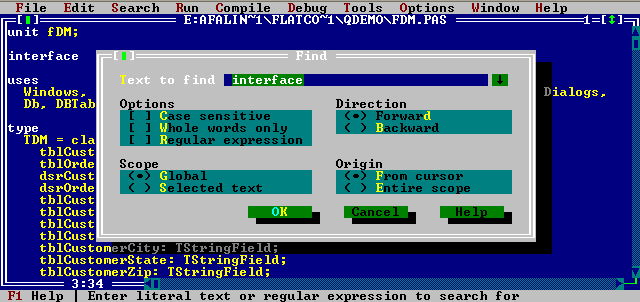

- #REFERENCE BOOKS FOR BORLAND TURBO PASCAL 7.0 SOFTWARE#
- #REFERENCE BOOKS FOR BORLAND TURBO PASCAL 7.0 CODE#
- #REFERENCE BOOKS FOR BORLAND TURBO PASCAL 7.0 PC#
- #REFERENCE BOOKS FOR BORLAND TURBO PASCAL 7.0 PLUS#
Turbo Pascal came with the "Book License": "You must treat this software just like a book. Unlike some other development tools, Turbo Pascal disks had no copy protection. The program was sold by direct mail order for $49.95, without going through established sales channels (retailers or resellers). Kahn's idea was to package all these functions in an integrated programming toolkit designed to have much better performance and resource utilisation than the usual professional development tools, and charge a low price for a package integrating a custom text editor, compiler, and all functionality need to produce executable programs.
#REFERENCE BOOKS FOR BORLAND TURBO PASCAL 7.0 PLUS#
Vendors of software development tools aimed their products at professional developers, and the price for these basic tools plus ancillary tools like profilers ran into the hundreds of dollars. This process was less resource-intensive than the later integrated development environment (IDE). For example, the Microsoft Pascal system consisted of two compiler passes and a final linking pass (which could take minutes on systems with only floppy disks for secondary storage, although programs were very much smaller than they are today).
#REFERENCE BOOKS FOR BORLAND TURBO PASCAL 7.0 PC#
In the early IBM PC market (1981–1983) the major programming tool vendors all made compilers that worked in a similar fashion.
#REFERENCE BOOKS FOR BORLAND TURBO PASCAL 7.0 CODE#
Programmers wrote source code using a text editor the source code was then compiled into object code (often requiring multiple passes), and a linker combined object code with runtime libraries to produce an executable program. Historically, the vast majority of programmers saw their workflow in terms of the edit/compile/link cycle, with separate tools dedicated to each task.

Philippe Kahn first saw an opportunity for Borland, his newly formed software company, in the field of programming tools.


 0 kommentar(er)
0 kommentar(er)
